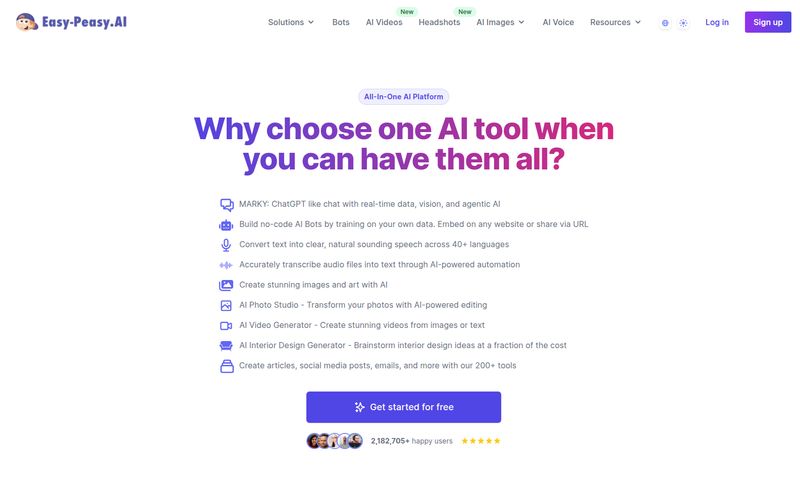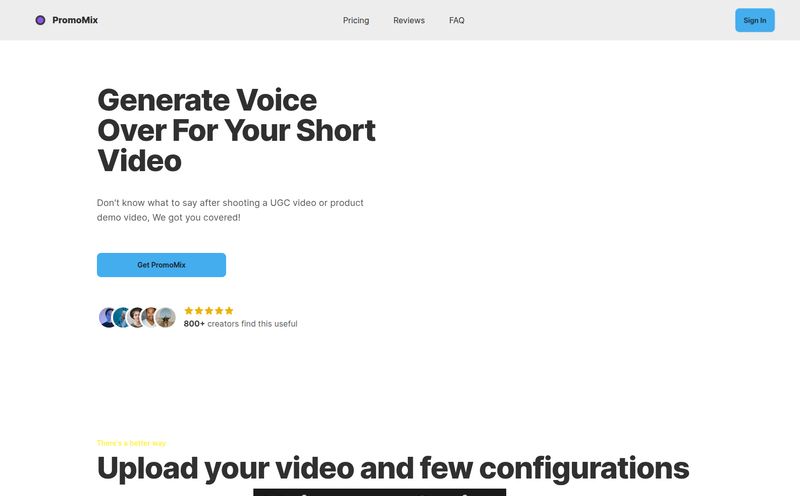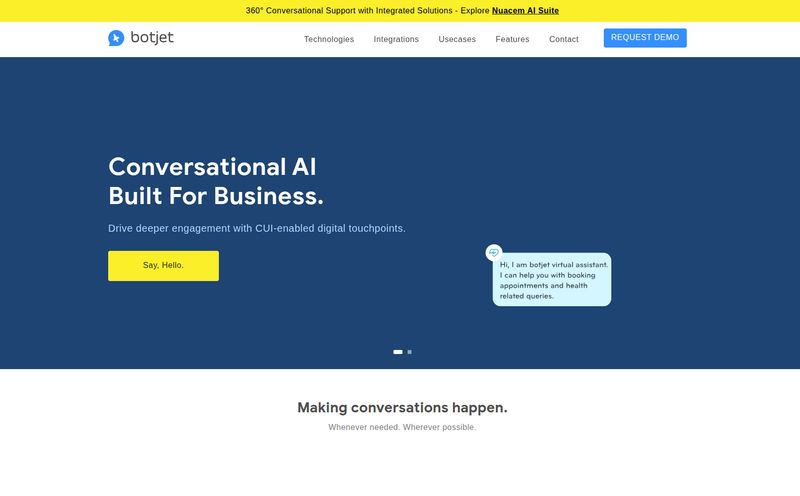We've all been there. You're on the phone with an automated system, and the voice on the other end sounds like a robot that's had one too many espressos. It’s flat, lifeless, and completely misses the mark. Or you're trying to use a speech-to-text app that writes down “I’ll have the pair” when you very clearly said, “I’ll have the pear.” Close, but no cigar.
For years, the world of Speech-to-Text (STT) and Text-to-Speech (TTS) has been a race for accuracy. Who can transcribe the fastest? Who has the most languages? But what if the next leap forward isn't about speed, but about… feeling? About understanding the sense behind the words.
That’s the promise of a fascinating new player on the block: Speech Intellect. I stumbled upon their site recently, and their whole approach just felt different. They're not just talking about words; they're talking about intent, tonality, and emotion. And as someone who’s spent way too much time generating traffic and analyzing user experience, that got my attention. Immediately.
So, What in the World is Speech Intellect?
At its core, Speech Intellect is a real-time STT and TTS platform. But that's like saying a Ferrari is just a car. The magic, they claim, is in their foundational technology—a new AI-focused mathematical theory they call “Sense Theory.”

Visit Speech Intellect
Now, I’m an SEO guy, not a mathematician, so I won’t pretend to understand the deep calculus behind it. But the concept is brilliantly simple. Instead of just converting sounds into text, Sense Theory tries to understand the meaning and emotional weight of each word in a sentence. It’s the difference between a machine hearing “That’s great” and a human understanding whether it was said with genuine excitement or dripping with sarcasm.
Think of it like this: most AI voice tools are like a student who memorized the dictionary. They know all the words, but they don't get the subtext. Speech Intellect aims to be the seasoned diplomat in the room, the one who reads the mood, understands the nuance, and knows that how you say something is just as important as what you say.
The Features That Make It Stand Out
This “sense-first” approach trickles down into all of its features, creating a suite of tools that feels more cohesive than many I've seen.
Speech-to-Text That Actually Listens
Their STT isn't just about getting the words right. It focuses on the emotional component of a conversation. Imagine a call center application. A standard STT can give you a transcript of a customer complaint. But Speech Intellect’s solution could, in theory, also flag that the customer sounded increasingly frustrated or confused. That’s not just data; that’s actionable insight. It’s about moving from transcription to comprehension.
Text-to-Speech With a Soul
This is the part that really excites me. Their TTS uses what they call a “sense-to-sense” algorithm. It doesn't just read text back; it reproduces it with appropriate intonation and tonality based on the context. The goal is to generate speech that’s almost indistinguishable from a human’s. We're talking about AI voices that can sound genuinely empathetic, authoratative, or cheerful. This could be a game-changer for everything from accessibility tools to podcast creation and, of course, customer service bots that don't make you want to throw your phone across the room.
A Powerful Combo for Smart Automation
Where it gets really powerful is when you combine these two. Speech Intellect allows you to create fully automated voice-based workflows. An AI can listen to a client (STT), understand their mood and the sense of their request, and then generate a spoken response (TTS) that is perfectly tuned to the situation. It could respond to a happy customer with an upbeat tone or handle a delicate situation with a more measured, respectful voice. That's the kind of subtle touch that builds trust and improves customer relationships.
That “Amorphous Encryption” Thing
In an age of constant data breaches, security is everything. Speech Intellect makes a point of highlighting their “Amorphous Encryption” technology. It sounds like something out of a sci-fi movie, but the principle is sound: they use a unique cryptographic method to store and transmit user data. They state that even in the unlikely event of a breach, the data would be essentially useless to outsiders. For any business handling sensitive customer conversations, that kind of peace of mind is invaluable.
Okay, But Is It Perfect? A Reality Check.
I’m always a bit skeptical of new tech that makes big promises. And it's important to be balanced here. The first thing to note is that the service is still in its beta version, as mentioned on their site. This means you might run into the occasional bug or inconsistency. It's the nature of the beast with any cutting-edge platform. The service may not always work as expected, and early adopters should go in with that understanding.
The other major point is that this isn't an out-of-the-box app for the average consumer. To get its full power, you need to integrate it via their API. For developers and businesses looking to build custom solutions, this is perfect—it's exactly what they want. But if you’re looking for a simple app to download and use immediately, this isn't it. This is a tool for builders.
Breaking Down the Cost: Speech Intellect Pricing
I appreciate a straightforward pricing page, and Speech Intellect delivers. There are no confusing monthly tiers or hidden fees. It’s a simple pay-as-you-go model based on the number of requests you make.
First off, they offer a free trial of 30 requests. It’s not a lot, but it’s enough to get a feel for the API and test the quality of the output. After that, the pricing is based on volume:
- Starting Tier: $10.00 per 1,000 requests
- Volume Discount 1: $9.00 per 1,000 requests (when you buy 10,000+)
- Volume Discount 2: $7.50 per 1,000 requests (when you buy 100,000+)
One of the best parts? The requests you buy never expire. I love this. You're not forced into a monthly subscription where you “use it or lose it.” You just buy a block of requests and use them as you need them. It's a fair, developer-friendly model that more companies should adopt.
Who Should Be Looking at Speech Intellect?
This platform isn’t for everyone, and that’s okay. I see a few key groups getting really excited about this:
- SaaS Companies: Any business building a product that involves voice interaction, from meeting transcription software to interactive learning tools.
- Customer Experience Innovators: Companies obsessed with improving their customer service through smarter, more empathetic automated systems.
- Developers & Startups: Anyone creating voice-first applications who wants to build on a platform that prioritizes nuance over raw speed.
- Content Creators: Think automated, high-quality voiceovers for videos or creating dynamic, responsive characters in audio-based stories or games.
Frequently Asked Questions
- What is Sense Theory?
- It's Speech Intellect's unique AI-based mathematical theory that analyzes the meaning, intent, and emotional tonality of spoken words, rather than just transcribing them literally.
- How secure is Speech Intellect?
- They use a proprietary technology called Amorphous Encryption, which is designed to provide a very high level of data security for all user information and conversations.
- How does the pricing work?
- It's a pay-as-you-go model. You buy a certain number of API requests, and they never expire. The price per request gets cheaper the more you buy at once.
- Is there a free trial to test it?
- Yes, every new customer gets 30 free requests to test the service and see if it fits their needs before committing.
- Do I need to be a developer to use it?
- For the most part, yes. Speech Intellect is an API-first platform, meaning it’s designed to be integrated into other software and applications by people with coding knowledge.
- How is this different from other TTS services?
- The main difference is the focus on emotion and intent. While others compete on clarity or the number of voices, Speech Intellect aims to create speech that sounds genuinely human because it understands the context of the text.
My Final Thoughts
I've seen a lot of AI tools come and go. Many are just slight variations on a theme. Speech Intellect feels different. It feels… ambitious. The idea of moving beyond the literal interpretation of words and into the realm of sense and emotion is, in my opinion, the correct direction for voice AI. It’s the next logical step.
Is it perfect yet? Probably not, it's still in beta. But the foundation is incredibly compelling. For any developer or business working on the cutting edge of voice technology, this is a platform that should absolutely be on your radar. It’s not just another voice tool; it’s a whole new way of thinking about the conversation between humans and machines.



